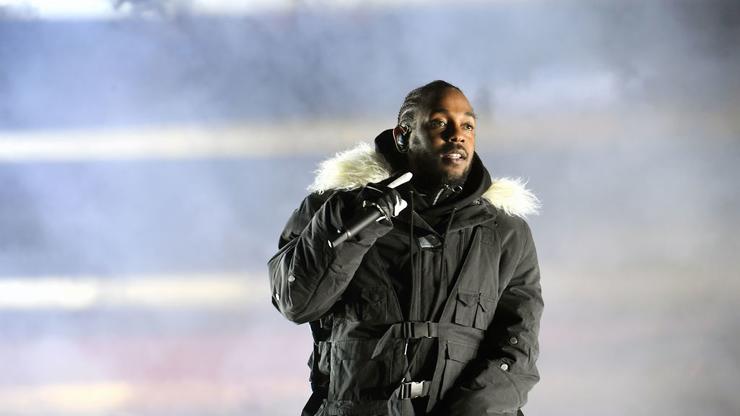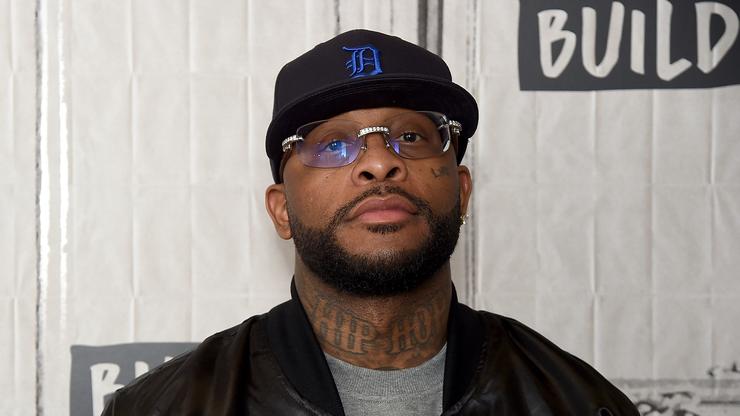Kendrick Lamar hasn't released a new album since 2017's DAMN, but there's something he has that many of his peers lack -- longevity. When K Dot drops an album, said album can sustain its presence for years on end; such is the benefit of writing songs packed with meaning, a testament to his Pulitizer Prize-winning pen-game. Now, with the world standing up against police brutality and systemic racism following the death of George Floyd, many have once again turned to the wisdom of Kendrick Lamar for inspiration.
While it goes without saying that To Pimp A Butterfly is an appropriate protest record, so much so that it recently re-entered the Apple Music Charts, Kendrick Lamar's Good Kid, maad City and DAMN have also seen renewed signs of life. As of last week, both of those projects re-entered the Billboard Top 200, with Good Kid climbing to 97 and DAMN sitting pretty at 106.
According to Chartdata, To Pimp A Butterfly has also experienced a massive boost in numbers, with Chartdata pointing to a one-hundred-and-twenty percent increase in sales -- look for that to appear in the updated Top 200, unsurprising given that songs like "Alright" and "The Blacker The Berry" have regained life as protest anthems. Clearly, the world is hungry for some new music from Kendrick Lamar, and given everything that has transpired in the world since his last release, we can only assume that he's about to come out swinging.
Have you been revisiting some K Dot classics?
Kendrick Lamar’s "To Pimp A Butterfly" Re-Enters Apple Music Charts
Kendrick Lamar’s masterpiece “To Pimp A Butterfly” continues to resonate, even five years removed from its initial release.
In 2015, Kendrick Lamar dropped off his third solo album, and second on a major label, To Pimp A Butterfly. Immediately hailed as a modern classic, the project was praised for its themes of racial identity and sociopolitical equality; songs like “Alright,” “Institutionalized,” “Complexion,” and the masterful “Blacker The Berry” continue to resonate to this day, perhaps now more than ever.

Kevin Mazur/Getty Images
Clearly, there are many who feel like revisiting the project amidst the George Floyd protests — so much so that the five-year-old album has once again entered the Top 100 charts on Apple Music. As of this moment, the album has managed to climb to the 76th spot on the U.S. Top 100, clocking in at 44th in the overall hip-hop charts — just behind Joyner Lucas‘ ADHD. Pretty impressive considering the album has been
The return to the charts is a testament to Kendrick’s impact as a songwriter, one capable of shifting an entire zeitgeist. Though fans have been eagerly awaiting his triumphant return, the recent protests have once again breathed new life into the album — and should the revolution continue, it’s likely that To Pimp A Butterfly is only going to continue thriving. Have you been putting To Pimp A Butterfly back into rotation?
Royce Da 5’9" Recalls First Time Touring Dr. Dre’s Mansion With Eminem
Royce Da 5’9″ shared a story of what it was like when he and Eminem toured Dr. Dre’s lavish property while recording in those early days.
One can’t count the number of highlights from Dr. Dre‘s career. The rap mogul is one of the most revered and respected musicians in hip hop, and while there have been plenty of monumental moments throughout his reign, his discovery and development of Eminem stands out among fans. It was decades ago that Dre and Em joined forces, and what emerged were hit songs, world tours, coveted awards, and street accolades. Rapper Royce Da 5’9″ recently reflected on what it was like recording with Dre back in those early days and he shared some wisdom delivered by the Aftermath founder.
“There was a door that we went to, I believe we went down some stairs to get in the studio room,” Royce recalled. “It was just like a studio in a building. Like, rather it had been in a house or in a building, it looked like we were in a huge studio in a building… After we had been coming back and recording there a couple days, he actually showed us the house.”
Royce added, “We went through another door and went up some stairs and now we’re in his kitchen. That was my first time being in a mansion. So, we lookin’ around, he’s showing us different rooms and then we think that’s the whole house and then it’s like, ‘Alright, come down here.’ Then we go down another long hallway and now we’re on a whole ‘nother side.” The house tour of all the rooms seemed like a never-ending process.
“The whole time, I just remember him going, ‘Now remember, money is easy to make, but it’s hard to keep,'” Royce said. Dre would take them from room-to-room occasionally interrupting his own train of thought to remind his guests that “money is easy to make, but hard to keep.” A line similar to that ended up on Kendrick Lamar‘s track “Wesley’s Theory” from To Pimp a Butterfly in a recorded message from Dre where the mogul says:
Yo, what’s up? It’s Dre
Remember the first time you came out to the house?
You said you wanted a spot like mine
But remember, anybody can get it
The hard part is keepin’ it, motherfu*ker
Check out Royce Da 5’9″ share his story in full below, including Eminem receiving permission to put his feet on the superproducer’s table.
Kendrick Lamar Vs. J. Cole: Who Had The Better Sophomore Album?
Kendrick Lamar and J. Cole go head-to-head.
“Genius.” It’s a term that gets thrown around in think-pieces across the internet every time one of these two guys drops new music. For Kendrick, the cachet was earned from the beginning after his major-label debut, good kid, m.A.A.d city. With tracks like “The Art of Peer Pressure,” and “Sing About Me, I’m Dying Of Thirst,” Kendrick displayed an indisputable knack for storytelling, combined with a distinct ability to carry overarching narratives throughout an album. Cannodading beats such as that on “m.A.A.d. city” juxtaposed with the drowsy, intoxicating production of “Swimming Pools” showed K-Dot knew when to turn it up and when to take a nuanced approach.
J. Cole attained the distinction in a slower fashion. Over the course of several solid mixtapes, Cole gained hype as one of the most promising young talents in the game, a reputation he would cement in the mainstream with his debut, Cole World: The Sideline Story. Cole proved he knew introspection with songs like “Lost Ones,” but could also drop hits such as “Work Out,” or “Lights Please.” His love for Jazz shines through on production throughout the album that feels anachronistic of the ’90s. Slow it down, add in some piano, and Cole has a baby-making-beat like “In The Morning” or “Lights Please” ready to go.
By Born Sinner and To Pimp A Butterfly, Cole and Kendrick found themselves in similar predicaments: Both artists had proved they could make a hit, but could they, not only do it again, but fight off a sophomore slump and improve their game?

Taylor Hill/Getty Images
LYRICISM
“It’s way darker this time,” Cole warns to start Born Sinner‘s harder-hitting intro “Villuminati.” It’s one of the conceptually tighter tracks on the album. Cole struggles between staying true to himself and being “real like Pac,” or flaunting his newfound fame and bragging “like Hov.”
Sometimes I brag like Hov, sometimes I’m real like Pac
Sometimes I focus on the flow to show the skills I got
Sometimes I focus on the dough, look at these bills I got
Throughout the album, Cole loosely follows the troubles of fame and fakeness of Hollywood, but at times tangentially tackles other topics that distract from an overarching purpose. “Power Trip,” for instance, is a smarter, more focused update to Cole’s aforementioned “Lights Please” and “In The Morning.” Cole presents the negatives of desire, playing a version of himself so infatuated with his crush he turns to murder (at least in the music video). He uses alcohol to battle his obsession and despite his rising fame, he can’t get over this girl. It’s an easy highlight from the album– the only issue being that it fails to contribute on a grander scale in any meaningful way.
The highest point on the album comes 15 tracks in with “Let Nas Down.” The lyrics detail the story of Nas, Cole’s idol, hearing his track “Work Out” and being disappointed in the radio-friendly style. Thematically, this is the most moving presentation of Cole’s struggle with fame. He explains the pressures of needing a radio-friendly single for labels to have faith in an artists’ commercial value and how the pressure forces artists to sell out.
By my mind that kept on sayin’
“Where’s the hits?” You ain’t got none
You know Jay’ll never put your album out without none
And, dog, you know how come
Labels are archaic, formulaic with they outcome
Overall, Born Sinner possesses a number of solid hits from Cole, with the occasional impressive witticism, but when presented as a complete package, it’s tied together like a poorly wrapped gift on Christmas.
With To Pimp A Butterfly, Kendrick Lamar takes his pen-game to unparalleled levels. Rare is the album as perfectly written as TPAB. On “Wesley’s Theory,” Kendrick opens the album with a sample from Boris Gardiner’s “Every N****r Is a Star,” and an introduction from Josef Leimberg. Both are callbacks to the album title and present imagery of a caterpillar emerging from a cocoon to become a beautiful butterfly; a clear metaphor to Kendrick rising from Compton into fame. Immediately the vibe is cut as Kendrick raps from the present. He paints rap as a woman whom he once loved but now merely fucks to “get my nut.”
From here on out, Kendrick tackles a new societal issue on each track: “Institutionalized” handles institutional racism; “u” handles depression; “Complexion (A Zulu Love)” handles beauty standards; and so on. Many tracks end with a new line from a mysterious poem. The songs all seem ostensibly unconnected, as if To Pimp A Butterfly is a series of anthologies, until a full poem is revealed at the end that ties everything together.
Lyrically, “These Walls” is a highlight from the album and an easy way to compare Kendrick’s style on TPAB to Cole’s on Born Sinner. For Kendrick’s sensual track, as opposed to Cole’s “Power Trip,” Kendrick tells the story of sleeping with the girlfriend of a man who is in jail for murdering Kendrick’s friend. Throughout, he continuously juxtaposes the walls of the woman’s vagina to the walls of the prison.
These walls want to cry tears
These walls happier when I’m here
These walls never could hold up
Every time I come around, demolition might crush
While Kendrick ran out of steam by the end of good kid with forgettable tracks like “Real” or “Compton,” he proved he doesn’t plan on quitting early this time around by finishing strong with some of his best tracks to date in “The Blacker The Berry” and “i.” “Mortal Man” concludes the album by revealing a conversation between Tupac and Kendrick using audio clips from an interview with Tupac prior to his death.
PRODUCTION
Production is Cole’s strongest asset on Born Sinner. It consistently stays true to his “darker” promise throughout. Cole produced the vast majority of the project himself, an impressive feat that helped give Born Sinner much-needed congruency. Each song is hard-hitting, beautiful, or both, with a number of beats including a spiritual feel that retains the religious tone of the artwork. Even the first sound on “Villuminati” stems from a choir. “Trouble” is the best example of this. It’s the darkest song on the album, but the lyrics are contrasted, in addition to the trap drums, with a chorus sung by a choir.
Cole implements sampling in a number of successful ways throughout Born Sinner such as on the track “LAnd of the Snakes,” which incorporates the classic Outkast song “Da Art of Storytellin’ (Pt. 1).” The sample subtextually compares Cole’s track to Outkast’s, as both speakers reminisce about girls from their past.
To Pimp A Butterfly forfeits any popular rap tropes from the time, instead favoring an amalgamation of Jazz, Funk, Soul, subtle 90’s boom-bap, and more. The production on every track is remarkably catchy and consistently matches the overall tone of the song and album as a whole. Kendrick tapped a myriad of talented musicians to help him in this regard: Flying Lotus, George Clinton, Sounwave, Pharrell Williams, Thundercat, Dr. Dre, Boi 1da, and more all assisted in producing this masterpiece.
“The Blacker The Berry” is the most boisterous track on TPAB. The beat aligns with the sheer anger Kendrick throws into the lyrics. He tackles self-hatred, black on black crime and more while the beat comes alive to rage as loud as Kendrick himself, before imploding into a soft, sultry jazz tune to conclude the record. Skip back five tracks and you’ll find the most euphoric production on the project. “For Sale? (Interlude)” sees Kendrick rapping in the third person from the perspective of “Lucy,” short for Lucifer, who represents major labels — not to mention the devil. The beat is piano and synth-heavy and presents an eerie disposition with the lyrics.
IMPACT
Both Born Sinner and To Pimp A Butterfly are important albums in the discographies of J. Cole and Kendrick Lamar. For Cole, Born Sinner showed that he could return to a more conscious and lyrical style of rap that helped him rise to fame through his mixtape era. Radio-hits like “Work Out,” as he explains on “Let Nas Down,” caused him to lose faith and reexamine his artistic merit. Cole was able to come back and drop an impressive album that, this time around, left Nas impressed. Nas even appeared on a remix of “Let Nas Down” titled “Made Nas Proud.”
For Kendrick, he proved that the success he found with good kid m.A.A.d. city was not an anomaly. Not only did Kendrick live up to the hype, he surpassed it and dropped one of the most impressive rap albums in modern music. To Pimp A Butterly tackles a horde of complex societal issues in a crisp, thematically coherent manner that features distinguished songwriting and experimental production. Let us know which album you think is best below.








